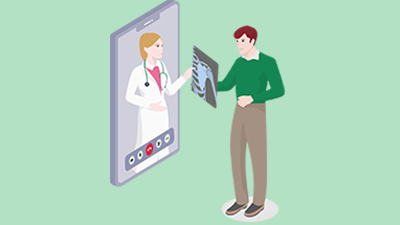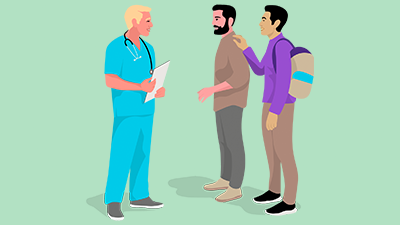AXA Health Mythbusters
In an age where we have so many resources to investigate anything and everything, it’s unsurprising that many of us end up more confused than before when searching for information. Health insurance provider AXA Health has commissioned a survey to poll 2,000 UK adults aged between 18 and 75 to uncover the most believed health myths, from sleep and fitness to home remedies and travel. It’s time to expose and debunk the most common health misconceptions for good.
When it comes to staying healthy, unreliable online sources can lead people to believe fake news and outdated scientific findings, causing them to incorrectly self-diagnose health-related issues.
Key findings overview
Our data reveals that 39% of those surveyed trust health information that is one week old, compared to 23% for information that is more than 4 years old. However, that’s over 1 in 5 of the UK relying on potentially outdated knowledge. Doctors remain the go-to source for health advice, with 45% of the UK asking them a medical query first, 20% asking Google as a priority, and only 2% turning to ChatGPT for answers.
- 78% of those surveyed who spend over four hours on social media daily are more likely to believe over five health myths
- Residents in the South West region are most likely to believe in health myths than anywhere else in the UK
- People trust doctors the most (86%) and TikTok the least (12%) for health information
- Almost 1 in 5 UK adults incorrectly believe that shaving hair makes it grow back thicker
- 30% of the UK population believes the myth that cranberry juice helps UTIs
- Around 1 in 5 respondents think you need to take 10,000 steps a day to be healthy, which isn’t strictly true
- 44% of people believe that eggs are bad for you, when this is a myth
- More than 1 in 10 UK adults believe having wet hair gives you a cold, which is a myth
- 74% of respondents inaccurately believe that gut bacteria doesn’t influence your mood
- 68% of those surveyed think that ginger doesn’t ease nausea and vomiting; however, this remedy is true
Almost 75% of the UK believes in five or more health-related myths
Our data revealed that around 3 in 4 (73%) of those surveyed believe in five or more health myths, increasing to 78% of those who spend over four hours on social media.

Interestingly, people who spend four or more hours on TikTok compared to those who spend less than 4 hours on the app are more likely to believe in more than five health myths (+17% increase to 89%).
Using other social media apps for longer than four hours a day also increases the likelihood of believing a health myth, compared to spending less than four hours or never using the platform, including YouTube (+8% increase to 84%), X (+9% increase to 81%), Facebook (+6% increase to 79%) and Instagram (+2% increase to 75%).
Discover AXA Health insurance

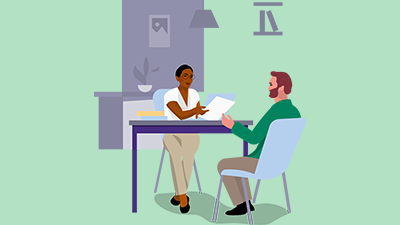
Compare health insurance
I'm interested in getting more information to compare health insurance options.
Top 10 general health myths most believed in the UK
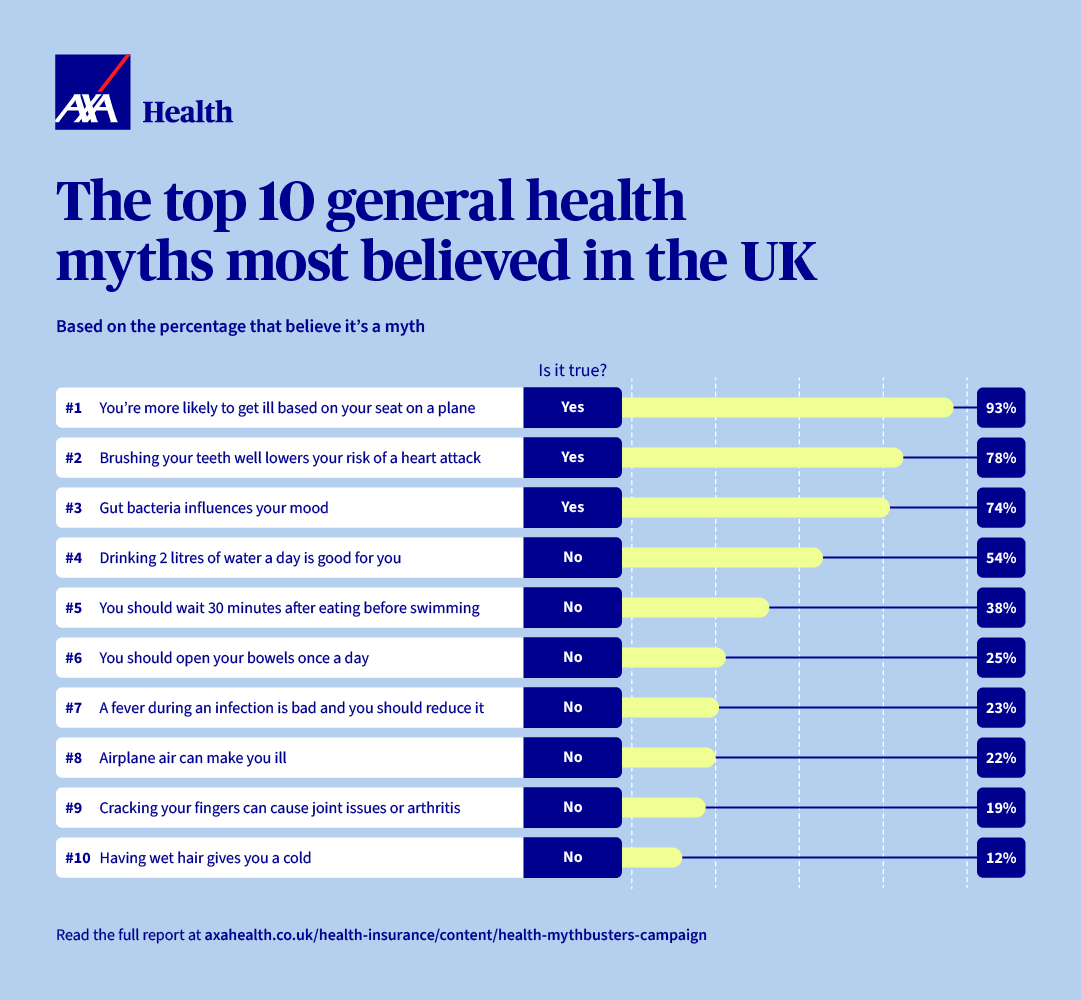
You’re more likely to get ill depending on where you sit on a plane - TRUE

Our survey found that 93% of people believe that where you sit on the plane doesn’t affect your likelihood of getting ill, making this travel-related statement the most believed health myth overall. Research from the National Academy of Sciences* found that passengers sitting in an aisle seat interact with 52 more individuals on each flight than a window seat, increasing exposure to illnesses.
Drinking two litres of water a day is good for you - MYTH
Our survey data found that 54% of the UK population believe we should all be drinking two litres of water daily, with 55-64-year-olds being most likely to believe this myth (64%) and 25-34-year-olds least likely (47%). This statement has some truth, as drinking water can help prevent dehydration, but it depends on your individual needs. Many factors affect how much water is good for you - the weather, health conditions, body weight, age, exercise levels, gender and pregnancy.
You should wait 30 minutes after eating before swimming - MYTH
Over a third (38%) of respondents believe you should wait 30 minutes after eating before swimming; however, no scientific evidence supports this myth. Swimming too soon after eating can cause minor stomach cramps, but there is no scientific support that it is a danger to your health. Instead, there are many health benefits of swimming, including boosting your heart health.
Brushing your teeth lowers your risk of a heart attack - TRUE
Only 22% of British people believe that cleaning their teeth can lower their risk of a heart attack, meaning 78% believe it doesn’t. According to the Oral Health Foundation*, using fluoride toothpaste and brushing their teeth for two minutes each day can reduce their risk of cardiovascular disease. Also, one-fifth (19%) believe another bathroom-related myth that shaving hair makes it grow back thicker.
Top 10 nutrition and fitness myths most believed in the UK
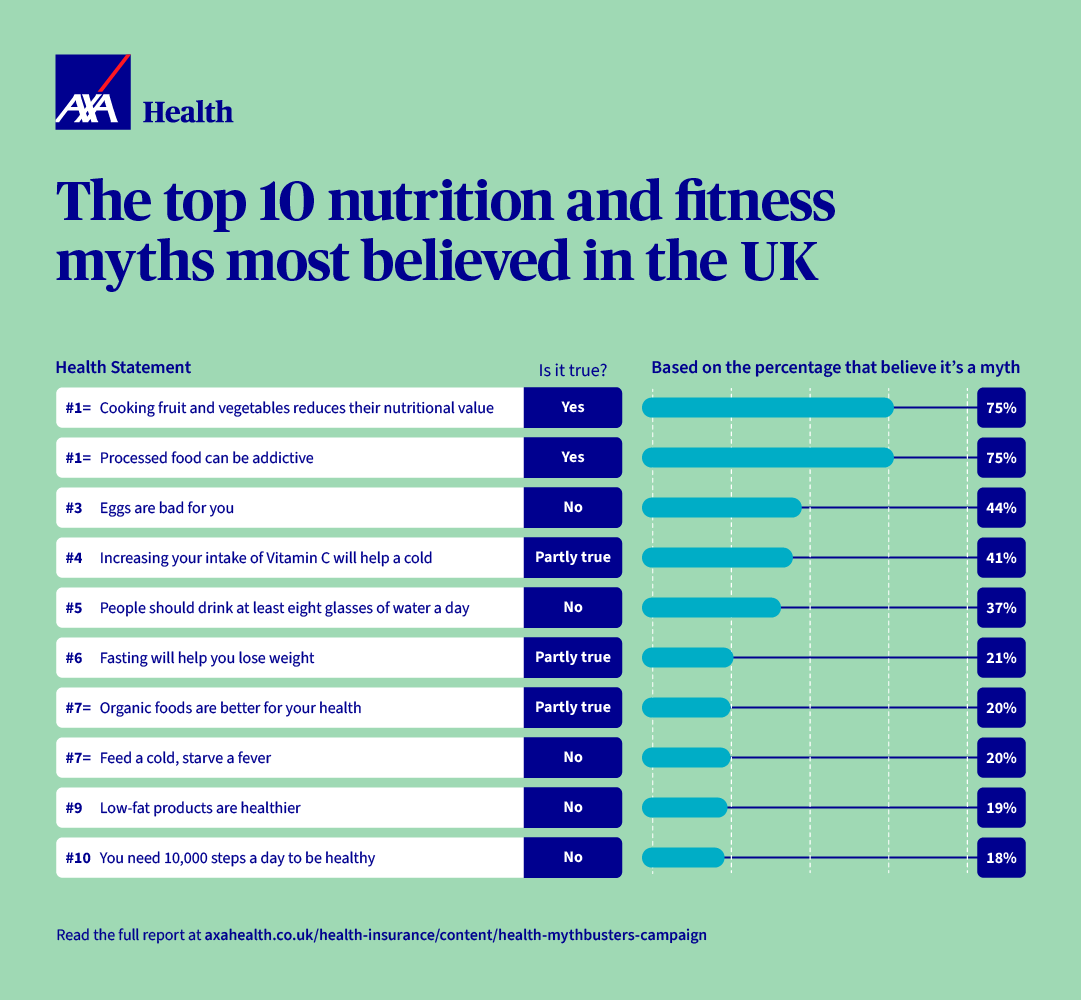
Cooking fruit and vegetables reduces their nutritional value - TRUE
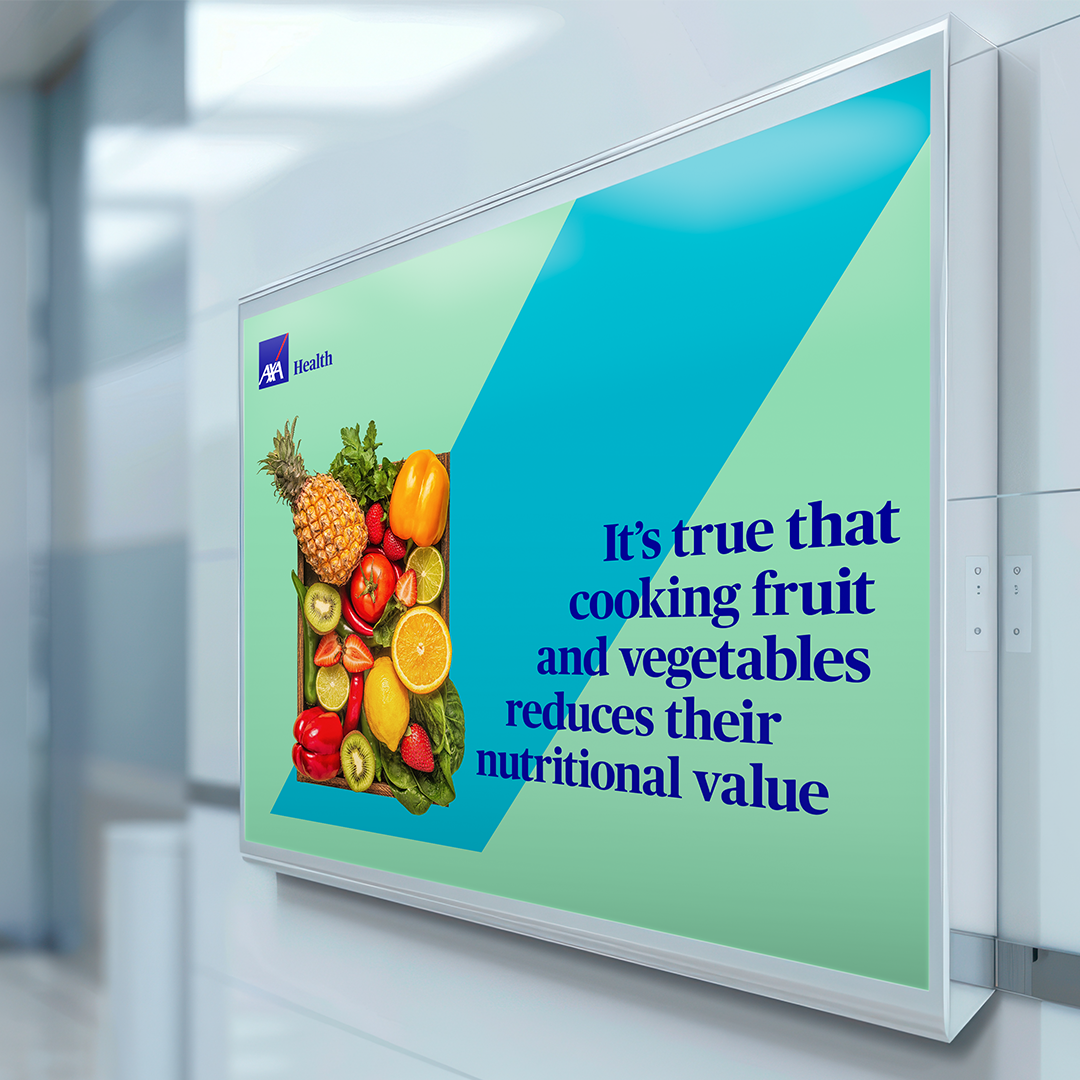
Only 25% of respondents believe this truth, meaning 75% believe that cooking fruit and vegetables doesn’t reduce their nutritional value, making this the most believed fitness and nutrition myth. Boiling these foods for a long time or reheating them in the microwave can particularly reduce their nutritional value, so opt for steaming and keeping the skins on. You can find out about more common fitness-related myths from our health experts.
Processed food can be addictive - TRUE
Three-quarters (75%) of the UK population believe that processed food isn’t addictive, meaning only a quarter believe the truth that it is. The added ingredients, such as sweeteners, activate the brain's pleasure centres and produce feel-good hormones, making processed food addictive. Reducing the amount of ultra-processed foods is important for maintaining a balanced diet.
Eggs are bad for you - MYTH
Our study revealed that almost half (44%) of UK adults believe eggs are bad for you. Although research has shown some connection between eggs and heart disease due to their high cholesterol content, which is much lower than foods with high trans and saturated fat levels, eggs provide nutrients such as protein. They can be cooked in many ways, such as an omelette.
The top 10 sleep health myths most believed in the UK
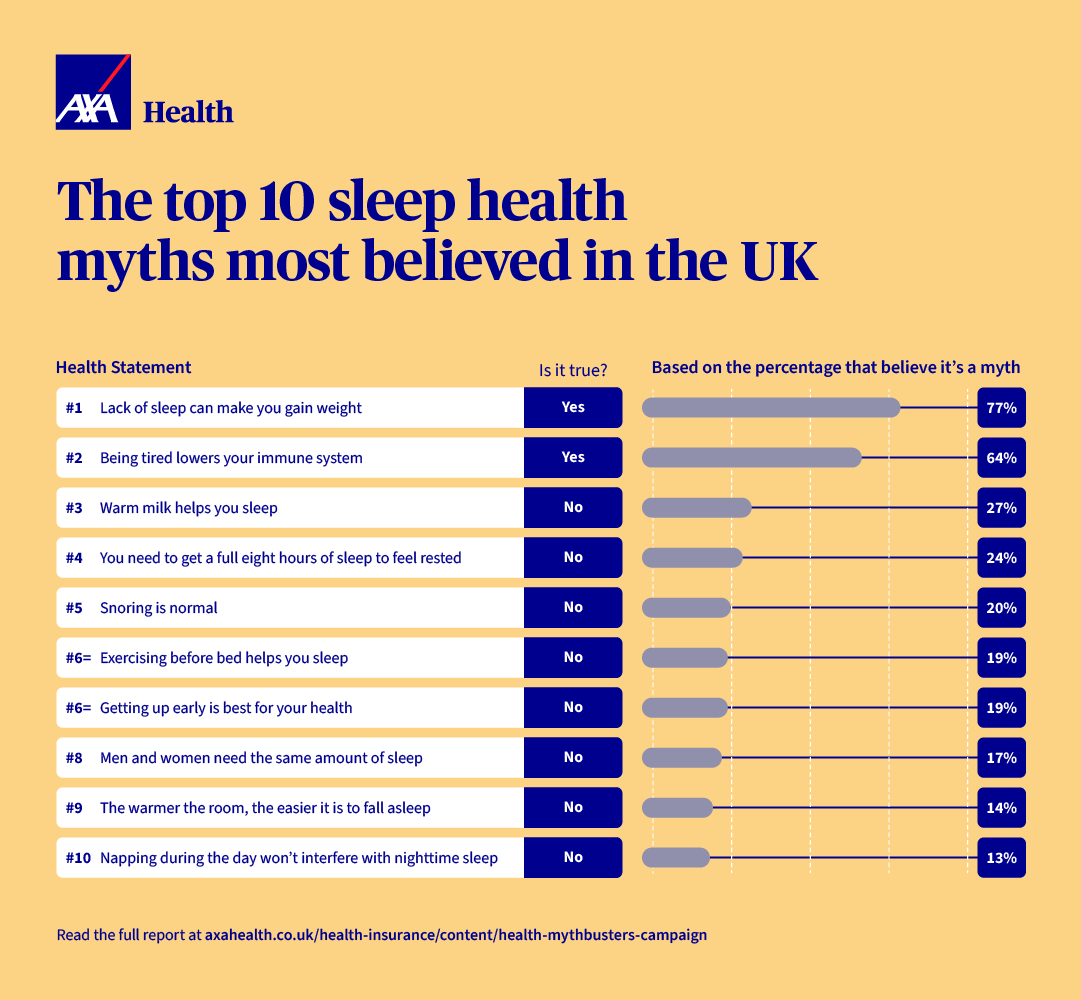
Being tired lowers your immune system - TRUE
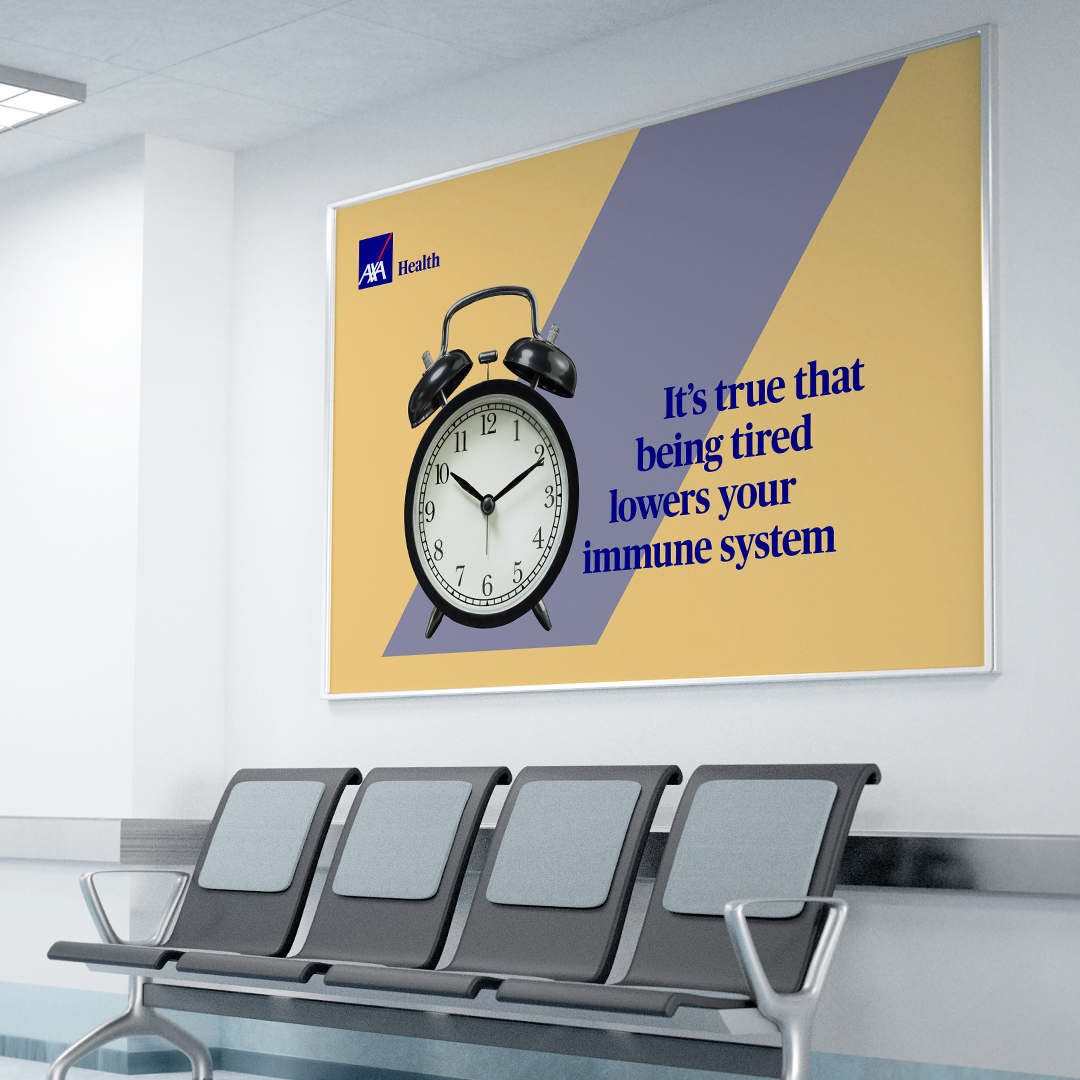
Our new data has revealed that 2 in 3 (64%) people believe lack of sleep does not lower your immune system. In fact, our immune system releases proteins known as cytokines when we sleep, and when you get sick, you need more of these, which can be reduced by sleep deprivation. When you don't get enough sleep, your body produces fewer antibodies and cells that fight infection. There are also other health benefits of sleep, including keeping our hearts healthy.
Lack of sleep can make you gain weight - TRUE
Over three-quarters (77%) of the UK population believe a lack of sleep can’t make you gain weight, and some (24%) even believe the myth that a full eight hours is needed to feel rested. A lack of sleep is classified as less than the seven hours required for optimal health, and getting less than this has been scientifically related to weight gain and a high BMI (Body Mass Index). Getting good quality sleep can help you maintain a healthy weight and boost immunity.
Men and women need the same amount of sleep - MYTH
Almost one in five (17%) UK adults believe that women and men need the same amount of sleep to feel rested. However, hormonal changes during menstruation and pregnancy might mean more sleep is required. But, if you’re struggling to sleep, don’t grab blue light-blocking glasses to cure your sleep problems, as this is also a myth.
You can learn more about sleep myths, including if cheese gives you nightmares, in our 11 common sleep myths debunked.
Top 10 home remedy myths most believed in the UK
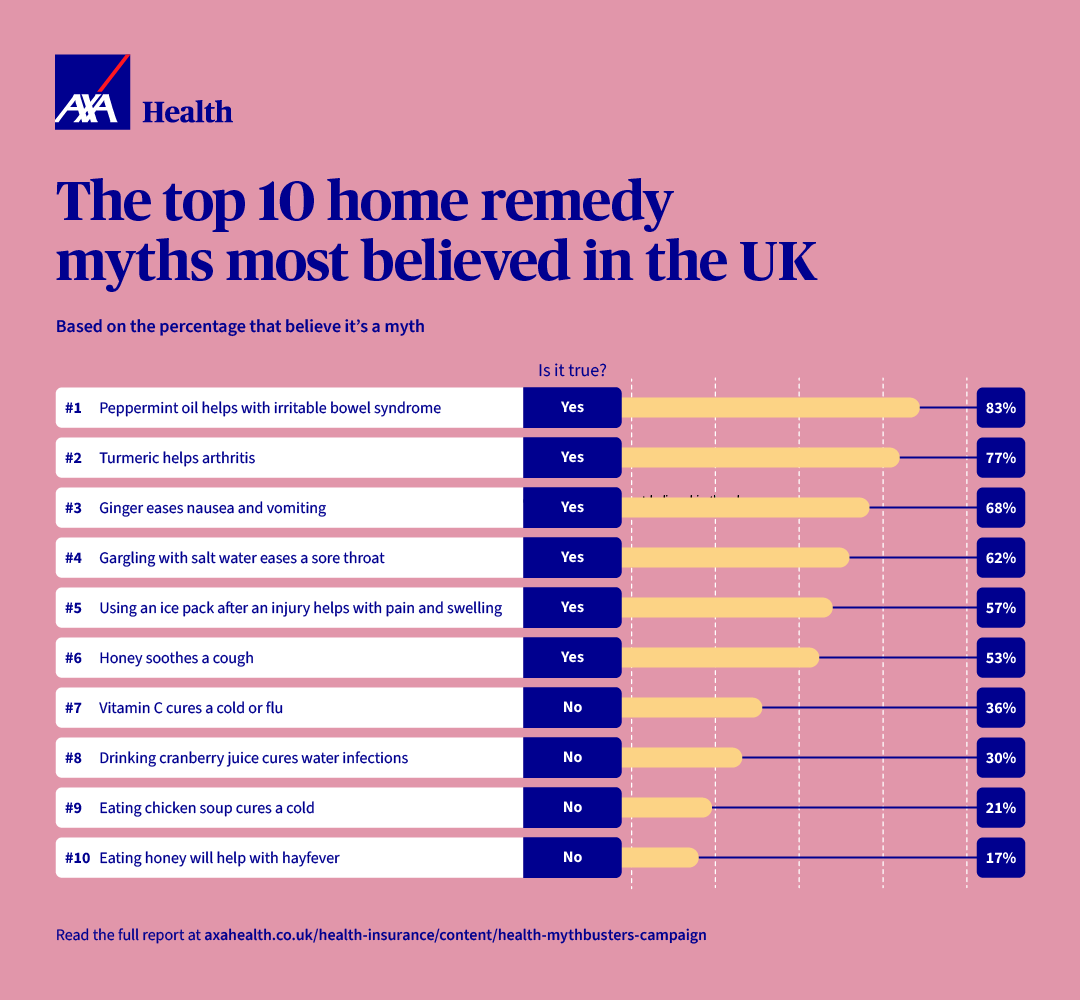
Drinking cranberry juice cures urinary tract infections (UTIs) - MYTH
Almost one-third (30%) of adults are convinced drinking cranberry juice will cure UTIs. No scientific evidence supports that cranberry juice can cure UTIs. However, some research suggests proanthocyanidins, a chemical found in cranberries, can prevent UTIs for those more prone to them.
Peppermint oil helps irritable bowel syndrome - TRUE
Over 8 out of 10 (83%) believe the myth that peppermint oil doesn’t help the symptoms of IBS (Irritable Bowel Syndrome). Peppermint oil can help regulate and reduce the urgency of bowel movements whilst reducing bloating related to IBS. Peppermint oil can also help reduce the pain associated with bowel discomfort.
Turmeric helps arthritis - TRUE
Around three-quarters (77%) of those surveyed believe that turmeric cannot help with symptoms of arthritis - but this is a myth, as turmeric contains anti-inflammatory properties due to its containment of curcumin, allowing it to ease symptoms of health conditions, such as arthritis.
Which UK regions believe the most health myths?
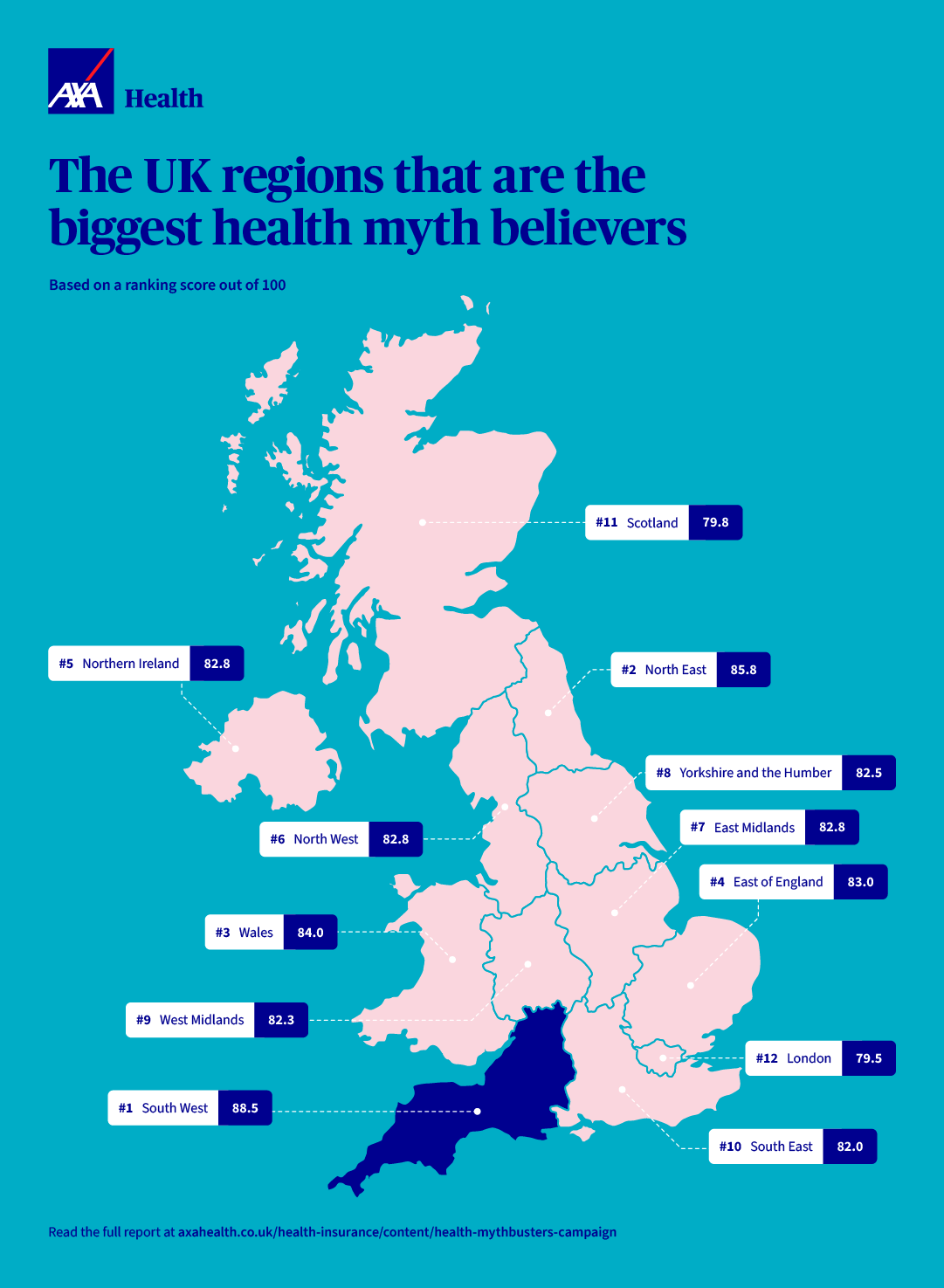
Our research has revealed the UK regions where health myths are most believed. Respondents living in the South West were most likely to believe in general health, fitness, sleep and home remedy myths with an average score of 88.5.
Those from the North East, Wales and East of England are also likely to believe general health myths, with average scores all above 83.
London has the fewest individuals who believe in health myths, with an average score of 79.5.
Which sources are the most trusted for providing health information?

Doctors came out on top, with 86% of those surveyed trusting in the health information they receive. The next most trusted source was friends, which 42% of the UK population trust to get accurate medical information.
News sites (36%) and online articles (30%) are also relatively trusted. However, only 12% trust the information we consume on TikTok regarding health, with 59% distrusting it, making the platform the least trusted for obtaining health information.
Where do people think they’ll hear inaccurate health information?
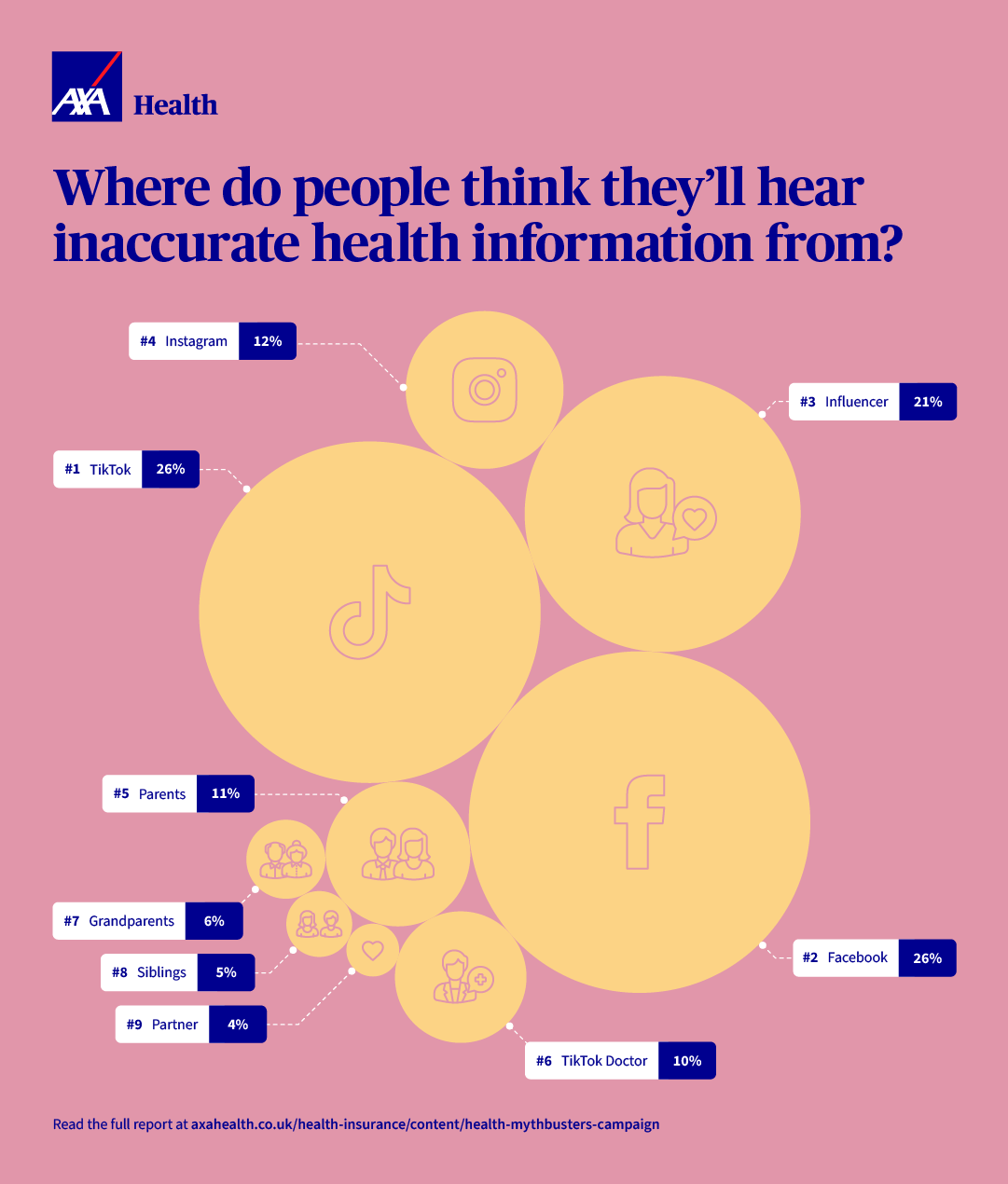
Over a quarter think these social media platforms provide incorrect health truths
Social media surrounds our world; unknowingly, we consume information daily from various sources. The platforms respondents think are least credible for medical information are TikTok (26%) and Facebook (26%).
1 in 5 people don’t believe influencers for accurate health advice
In the age of influencers, it may not come as a surprise that many creators attempt to share medical information with their followers - 21% believe this information is likely to be inaccurate.
Also, 12% of respondents believe Facebook’s health advice is likely to be inaccurate, whilst 1 in 10 believe TikTok doctors are likely to provide incorrect details about health.
References:
- 1. Tooth brushing habits tied to risk of heart disease - Oral Health Foundation
- 2. Behaviors, movements, and transmission of droplet-mediated respiratory diseases during transcontinental airline flights, Proc. Natl. Acad. Sci. U.S.A. 115 (14) 3623-3627. - V.S. Hertzberg, H. Weiss, L. Elon, W. Si, S.L. Norris. 2018.
Methodology
AXA Health surveyed 2,000 UK nationally representative participants aged between 18 and 75 in November 2024. Survey questions included respondents’ daily use across different social media platforms and their likelihood of believing a range of different health statements, including general health, fitness, sleep and home remedies.
The survey also asked where and who participants think they’re most likely to hear inaccurate information from and who they’d ask first regarding a medical concern/query. Also, the survey data looked at trust based on different information sources and how old the information is.
The average score for UK regions is based on the myths most believed by residents for each myth category (general, fitness, sleep, and home remedy) in each UK region. We then combined the percentages and divided them by four to get a score out of 100.

